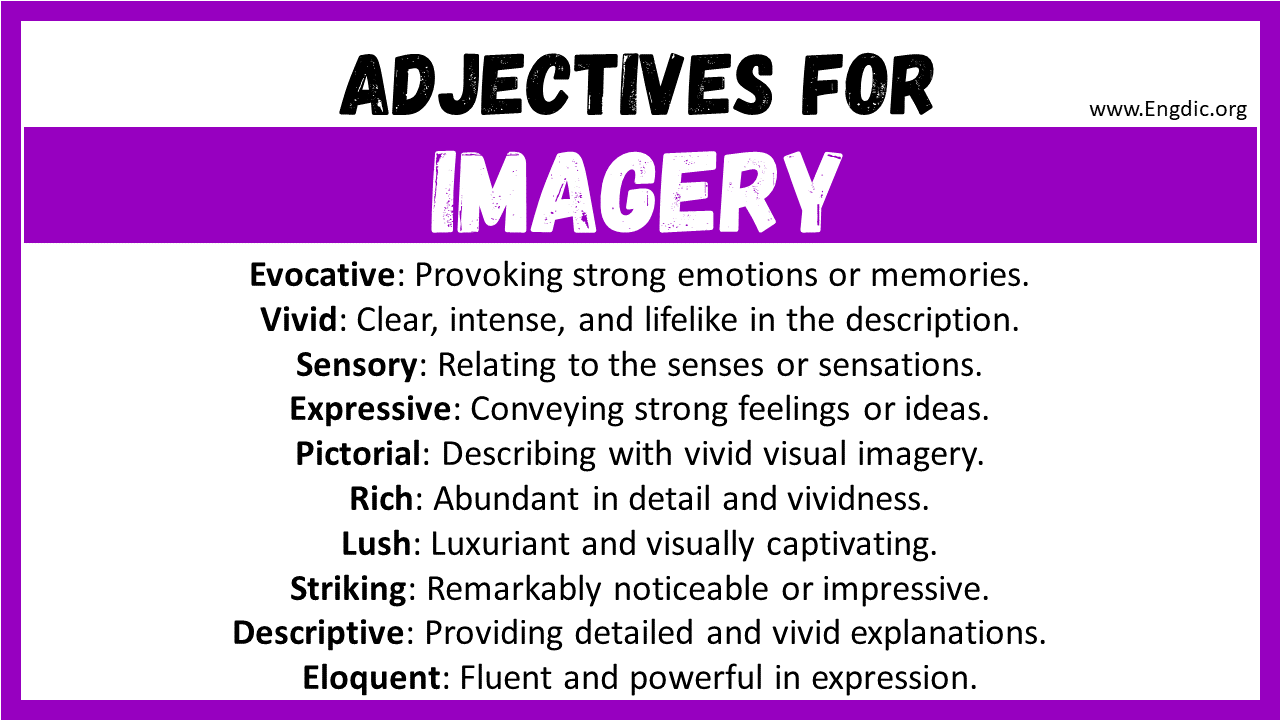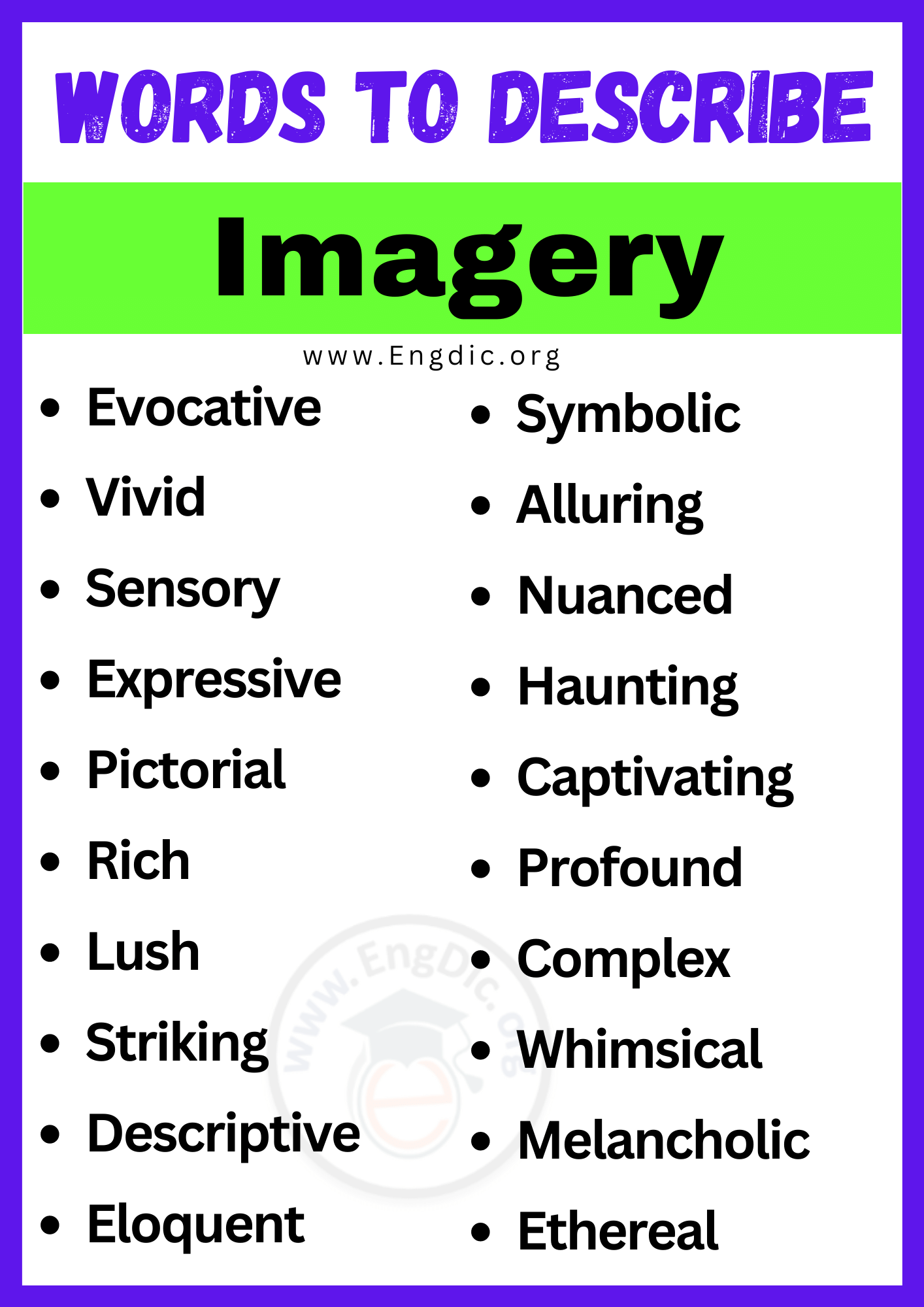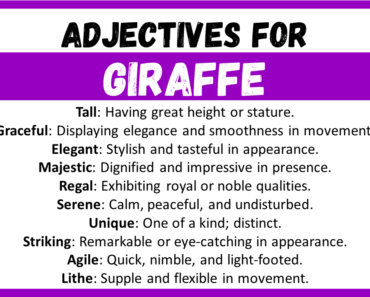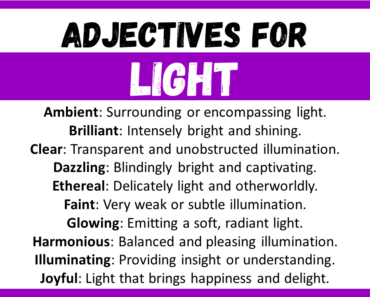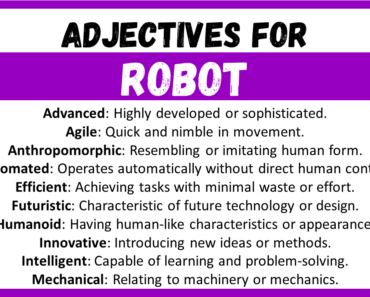Imagery is a powerful tool that writers use to create vivid and captivating mental pictures in the minds of their readers. It adds depth, emotion, and sensory details to their storytelling. When it comes to describing imagery, the choice of words becomes essential. The words used to portray visual, auditory, tactile, gustatory, and olfactory sensations can transport us to different worlds, evoke emotions, and enhance our reading experience. In this blog post, we will explore a variety of words that capture the essence of imagery, enabling writers to paint vibrant scenes and engage readers in a rich sensory journey.
Adjectives for Imagery
Here are the 20 Most Popular adjectives for imagery:
- Evocative
- Vivid
- Sensory
- Expressive
- Pictorial
- Rich
- Lush
- Striking
- Descriptive
- Eloquent
- Symbolic
- Alluring
- Nuanced
- Haunting
- Captivating
- Profound
- Complex
- Whimsical
- Melancholic
- Ethereal
Adjectives for Imagery in Literature:
- Vivid
- Evocative
- Lush
- Striking
- Descriptive
- Rich
- Vibrant
- Sensory
- Pictorial
- Expressive
Adjectives for Imagery in AP Literature:
- Nuanced
- Symbolic
- Profound
- Intense
- Haunting
- Alluring
- Complex
- Layered
- Captivating
- Thought-provoking
Adjectives for Imagery in a Poem:
- Ethereal
- Melancholic
- Enchanting
- Whimsical
- Serene
- Awe-inspiring
- Majestic
- Surreal
- Intimate
- Eloquent
Words to Describe Imagery with Meanings
- Evocative: Provoking strong emotions or memories.
- Vivid: Clear, intense, and lifelike in the description.
- Sensory: Relating to the senses or sensations.
- Expressive: Conveying strong feelings or ideas.
- Pictorial: Describing with vivid visual imagery.
- Rich: Abundant in detail and vividness.
- Lush: Luxuriant and visually captivating.
- Striking: Remarkably noticeable or impressive.
- Descriptive: Providing detailed and vivid explanations.
- Eloquent: Fluent and powerful in expression.
- Symbolic: Representing deeper or hidden meanings.
- Alluring: Highly attractive and captivating.
- Nuanced: Having subtle or intricate details.
- Haunting: Poignant and difficult to forget.
- Captivating: Holding attention or interest completely.
- Profound: Deeply meaningful or thought-provoking.
- Complex: Intricate and multifaceted in nature.
- Whimsical: Playfully imaginative and charming.
- Melancholic: Eliciting a feeling of thoughtful sadness.
- Ethereal: Delicate and otherworldly in nature.
Example Sentences for Imagery Adjectives
- The sunset painted an evocative canvas.
- Her vivid description transported me there.
- The aroma was sensory bliss.
- His expressive words stirred my emotions deeply.
- The writer’s pictorial language brought scenes to life.
- The story was a rich tapestry of imagery.
- The painting’s colors were lush and vibrant.
- The fireworks created a striking display in the sky.
- The author’s descriptive prose painted a vivid picture.
- His speech was eloquent and persuasive.
- The use of symbolic imagery added depth to the poem.
- The painting had an alluring charm that captivated viewers.
- The poem’s nuanced metaphors revealed hidden meanings.
- The haunting melody brought tears to my eyes.
- The movie’s captivating visuals left me in awe.
- Her poem carried a profound message about life.
- The novel had a complex web of imagery and symbolism.
- The story had a whimsical and magical atmosphere.
- The melancholic music resonated with my emotions.
- The ballet performance felt ethereal and otherworldly.
Explore More Words:
FAQ’s
How to describe imagery in writing?
Describe imagery in writing by using vivid, sensory language that appeals to the reader’s senses, creating mental pictures and evoking emotions.
What is the imagery in literature?
Imagery in literature refers to the use of vivid and descriptive language to create sensory experiences in the reader’s mind, bringing the text to life and enhancing the reader’s engagement.
What is imagery in the figure of speech?
In the figure of speech, imagery refers to the use of descriptive language and vivid sensory details to create mental pictures and evoke sensory experiences in the minds of the listeners or readers, making the language more expressive and engaging.
